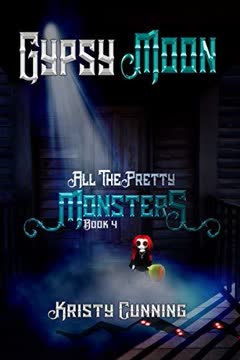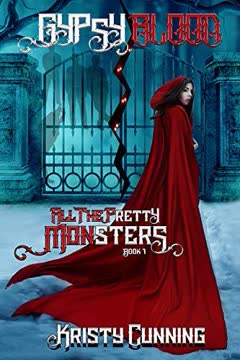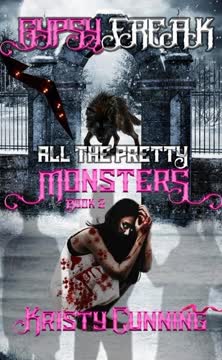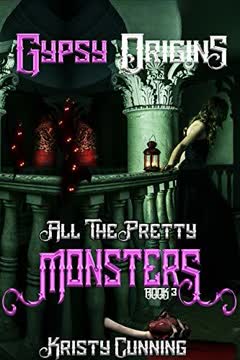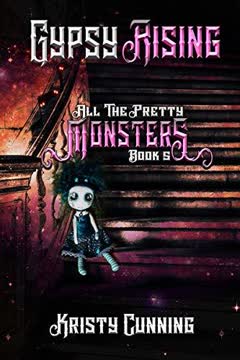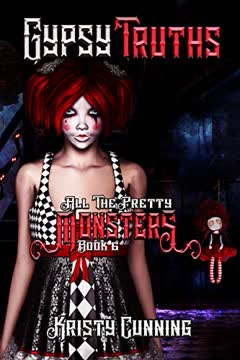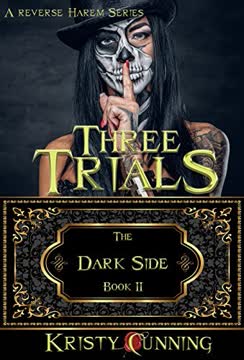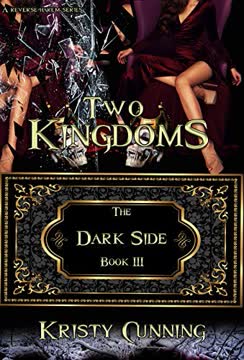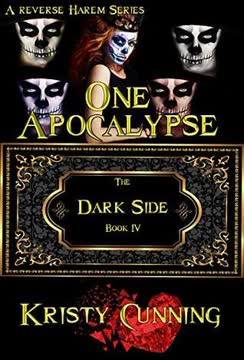Plot Summary
Prologue: Broken Alliances
The story opens with a flashback: the four alpha monsters—Vance, Damien, Emit, and Arion—are fractured by betrayals and the manipulations of Idun, the ancient and terrifying vampire queen. Their uneasy truce is built on mutual distrust, old wounds, and the looming threat of Idun's return. The prologue sets the tone: these monsters are both powerful and deeply damaged, their relationships defined by cycles of loyalty, betrayal, and the struggle for dominance. The seeds of the current crisis are sown in these old conflicts, as the alphas realize that their unity is fragile and their enemies—both within and without—are gathering strength.
Captive Gypsy, Rattled Chains
In the present, Violet (the gypsy heroine) and Shera (a vampire beta) awaken chained in a wolf den, kidnapped by rebellious omega wolves. Their banter reveals the complex monster hierarchy—alphas, betas, omegas—and the dangerous politics of their world. Violet's unique abilities (fainting on command, resilience, and a mysterious connection to death) are highlighted as she and Shera strategize their escape. The scene is laced with dark humor and tension, as Violet's "fainting" proves to be a surprisingly effective survival tactic. The chapter establishes Violet's outsider status and the precariousness of her position among monsters.
Monsters Plot, Gypsy Faints
The alphas—Vance, Arion, Emit, and Damien—gather to plan Violet's rescue, each blaming the others for her predicament. Their personalities and rivalries clash, revealing their obsession with Violet and their inability to cooperate. Meanwhile, Violet and Shera's escape attempts are complicated by the threat of starvation, the politics of monster feeding, and the looming danger of Arion's monstrous side. The chapter explores the monsters' curses, the rules of their world, and the way Violet's presence disrupts the established order.
Alphas Clash, Wolves Scheme
The alphas' rescue attempt is fraught with mistrust and old grievances. As they close in on the wolf den, their unity is tested by personal vendettas and the manipulations of Abby, a wolf with her own agenda. The rescue is complicated by the monsters' curses—each alpha's power comes with a price, and their ability to work together is undermined by their history with Idun and each other. The chapter ends with a violent confrontation, the unleashing of monstrous powers, and the realization that Violet is at the center of a much larger conflict.
Vampire Curses, Wolf Guilt
In the aftermath of the rescue, the alphas and Violet confront the emotional and psychological consequences of their actions. Guilt, jealousy, and unresolved feelings surface as Violet navigates her complicated relationships with each alpha. The monsters' curses—immortality, bloodlust, and the inability to die—are explored in greater depth, revealing the cost of their power and the ways they are haunted by their pasts. Violet's empathy and resilience become a source of both strength and vulnerability, as she struggles to set boundaries and assert her own agency.
Dream Windows, Bloody Pasts
Violet's unique connection to death allows her to access "death windows"—visions of the past that reveal the origins of the monsters' curses and the true nature of Idun's reign. Through these visions, Violet witnesses the brutality of the past, the creation of the monster Houses, and the betrayals that shaped the alphas. The chapter deepens the mythology of the world, showing how the monsters' present struggles are rooted in ancient traumas and unresolved conflicts.
Ghosts, Gifts, and Chocolate
Violet is visited by ghostly triplets who pressure her to break the alphas' curses and warn her about Idun's return. The alphas compete for Violet's affection with gifts, chocolate, and grand gestures, but their rivalry only adds to her confusion. The ghosts' meddling, combined with the alphas' possessiveness, pushes Violet to question her own desires and the nature of her relationships. The chapter balances supernatural intrigue with romantic comedy, highlighting Violet's struggle to maintain her independence.
Lightning Rod, Plane Crash
As the group travels to Europe to confront the threat of Idun's rising, their private jet is struck by lightning—drawn to Violet, who is a living lightning rod. The crash is both harrowing and revelatory: Violet's ability to absorb and channel massive amounts of energy is showcased, but at great personal cost. The aftermath leaves the group stranded, injured, and forced to confront the reality of Violet's unique role in the monster world. The event foreshadows the coming storm—both literal and metaphorical.
Castle Climb, Monster Truths
The group ascends the mountain to Idun's ancestral castle, a place haunted by memories and secrets. Inside, Violet discovers portraits, death spots, and evidence of the monsters' brutal history. She experiences a death window that reveals the torture and suffering inflicted by Idun, especially on the Simpletons (the original, "forgotten" monsters). The castle becomes a crucible for truth, forcing Violet and the alphas to confront the legacy of Idun's cruelty and the unresolved pain that binds them.
Portraits, Death Spots, Beasts
Violet's exploration of the castle leads to a confrontation with a monstrous beast—Blue, a hellhound left behind by the Neopry family. The encounter is both terrifying and symbolic, representing the dangers that lurk in the monsters' past and the ways Violet is forced to face them alone. The chapter weaves together themes of memory, trauma, and resilience, as Violet survives by relying on her wits and her connection to the alphas.
Possession, Boundaries, and Betrayals
Violet is possessed by the ghostly triplets, who use her body to seduce Arion, crossing boundaries and leaving both Violet and Arion shaken. The incident exposes the dangers of supernatural interference and the fragility of trust among the group. The alphas' rivalry intensifies, and Violet is forced to assert her autonomy, setting new boundaries and demanding accountability. The chapter explores the psychological toll of possession, betrayal, and the struggle for control in a world where consent is often violated.
Mother Returns, Secrets Unravel
Violet's mother, Marta Portocale, returns in a new body, revealing herself as an immortal gypsy with her own agenda. Marta's presence upends the group dynamic, as she brings new information about Idun's rising, the true nature of Violet's heritage, and the politics of the monster world. Mother and daughter clash over secrets, boundaries, and the meaning of family, while the alphas are forced to reckon with Marta's power and her claim on Violet. The chapter is a turning point, as old secrets are exposed and new alliances are forged.
Resurrection Storm, Forgotten Monsters
In a climactic ritual, Violet uses her unique abilities to break the seals on the burial ground of the Simpletons—the forgotten monsters. Channeling lightning, salt, and her own pain, she resurrects the Neopry, stitching their bodies together and restoring them to life. The act is both triumphant and harrowing, fulfilling Violet's purpose but leaving her drained and vulnerable. The resurrection changes the balance of power, as the forgotten monsters return to claim their place in the world. The chapter explores themes of sacrifice, destiny, and the cost of power.
Marta's Bargain, Violet's Choice
Marta and Violet negotiate the terms of their relationship, using a ritual with a doll as a symbolic timer for Marta's interference. The scene is both poignant and tense, as Violet asserts her independence and Marta is forced to acknowledge her daughter's agency. The alphas watch, realizing that Violet is no longer a pawn but a player in her own right. The chapter highlights the importance of choice, boundaries, and the struggle to define one's own destiny.
Idun Rises, Sides Shift
News spreads that Idun has risen, months ahead of schedule, and is already manipulating events from the shadows. The monster Houses are thrown into chaos, as old alliances fracture and new sides are drawn. Marta warns that Violet's role is not over, and that the coming conflict will test everyone's loyalties. The alphas are forced to choose between their obsession with Violet and their duty to their Houses. The chapter sets the stage for the coming war, as the true cost of power and love becomes clear.
The Cost of Purpose
In the aftermath of the resurrection, Violet is left physically and emotionally exhausted, her purpose seemingly fulfilled. The alphas and Marta debate her future, torn between protecting her and using her as a weapon in the coming conflict. The chapter ends with a sense of foreboding: the rules are changing, the sides are shifting, and Violet's place in the world is more precarious than ever. The cost of her purpose is revealed—not just in pain and sacrifice, but in the loss of innocence and the threat of becoming obsolete in a world that only values power.
Characters
Violet Portocale
Violet is the heart of the story: a Portocale gypsy with mysterious powers, a unique connection to death, and a knack for surviving impossible situations. She is both an outsider and a catalyst, her presence disrupting the monster hierarchy and forcing the alphas to confront their own demons. Violet's psychological journey is defined by her struggle for autonomy, her empathy, and her resilience in the face of trauma. She is haunted by questions of identity—omega, beta, or something new—and her relationships with the alphas are both a source of strength and vulnerability. Her development is marked by increasing agency, as she learns to set boundaries, assert her desires, and claim her place in a world that wants to use her.
Vance Van Helsing
Vance is the head of the Van Helsing House, a monster slayer cursed with immortality and a relentless drive for order. He is disciplined, strategic, and emotionally guarded, but his obsession with Violet reveals a softer, more vulnerable side. Vance's relationship with Violet is marked by mutual respect, unspoken longing, and the tension between duty and desire. Psychologically, he is haunted by guilt, the burden of leadership, and the fear of losing control. His development is tied to his willingness to trust, to share power, and to confront the ghosts of his past.
Arion
Arion is the most dangerous and unpredictable of the alphas: a vampire with little soul left, defined by his loyalty to Idun and his struggle to break free from her influence. His obsession with Violet is both genuine and self-serving, as he seeks redemption and a new purpose. Arion's psychological complexity lies in his capacity for both cruelty and tenderness, his fear of abandonment, and his desperate need for connection. His development is marked by moments of vulnerability, the breaking of old vows, and the possibility of change—even for a monster.
Damien Morpheous
Damien is the head of the Morpheous House, known for his illusions, sexual appetite, and the curse that keeps him from true intimacy. He is both comic relief and tragic figure, using humor and seduction to mask his loneliness and insecurity. Damien's relationship with Violet is playful, passionate, and fraught with the fear of being forgotten. Psychologically, he is driven by a need for validation, the pain of isolation, and the hope that Violet can break his curse. His development is tied to his willingness to be vulnerable, to apologize, and to fight for something real.
Emit Morrigan
Emit is the head of the Morrigan House, a werewolf haunted by guilt, self-loathing, and the burden of leadership. He is passionate, loyal, and often conflicted, struggling to balance his responsibilities to his pack with his feelings for Violet. Emit's psychological journey is defined by his struggle to forgive himself, to accept love, and to assert his own needs. His development is marked by moments of courage, self-sacrifice, and the realization that vulnerability is not weakness.
Marta Portocale
Marta is Violet's mother and a legendary figure in the monster world. She is cunning, resourceful, and fiercely protective, but her love is often expressed through manipulation and secrecy. Marta's return upends the group dynamic, as she brings new information, old grudges, and her own agenda. Psychologically, she is driven by fear—of Idun, of losing Violet, and of her own past mistakes. Her development is marked by moments of vulnerability, the struggle to let go, and the challenge of seeing Violet as an equal rather than a pawn.
Idun
Idun is the central antagonist: a vampire queen whose return threatens to upend the monster world. She is cunning, patient, and terrifyingly powerful, her influence felt even before she appears on the page. Idun's psychological complexity lies in her need for control, her capacity for cruelty, and her ability to inspire both fear and loyalty. She is both a symbol of the past's unresolved traumas and a catalyst for the coming war.
Shera
Shera is a vampire beta who serves as both comic relief and voice of reason. She is tough, pragmatic, and fiercely loyal to Arion, but her relationship with Violet reveals a softer, more vulnerable side. Psychologically, she is driven by the need to survive, the fear of being expendable, and the hope for something better. Her development is marked by moments of courage, honesty, and unexpected friendship.
Abby
Abby is a wolf who leads the rebellion against the alphas, driven by resentment, ambition, and a desire for freedom. She is both a victim and a perpetrator, manipulated by larger forces and ultimately undone by her own choices. Psychologically, she is driven by the need for recognition, the pain of being overlooked, and the hope for a better world. Her development is marked by moments of defiance, vulnerability, and tragic consequence.
The Ghost Triplets
The ghostly triplets serve as supernatural meddlers, pushing Violet to break curses, warning her about Idun, and crossing boundaries in pursuit of their own goals. They are both comic relief and a reminder of the thin line between life and death in the monster world. Psychologically, they are driven by the fear of oblivion, the desire for immortality, and the need to be seen. Their development is marked by moments of mischief, regret, and the hope for redemption.
Plot Devices
Monster Hierarchy and Curses
The narrative is structured around the complex hierarchy of monsters—alphas, betas, omegas—and the curses that define their existence. Each House has its own rules, powers, and vulnerabilities, and the interplay between them drives much of the conflict. The curses (immortality, bloodlust, the inability to die, etc.) serve as both sources of power and psychological torment, shaping the characters' motivations and relationships. The structure of the Houses, the rules of resurrection, and the politics of monster society are all used to explore themes of power, trauma, and the cost of survival.
Death Windows and Visions
Violet's ability to access "death windows"—visions of the past triggered by proximity to death—serves as a key plot device. These visions reveal hidden histories, foreshadow future events, and provide crucial information about the origins of the monsters' curses and the true nature of Idun's reign. The device allows for non-linear storytelling, deepening the mythology and connecting the present to the traumas of the past.
Possession and Consent
The theme of possession—both literal (ghosts taking over bodies) and metaphorical (the struggle for control in relationships)—is used to explore issues of consent, autonomy, and violation. The ghost triplets' possession of Violet, the monsters' struggle to control their own powers, and the manipulations of Idun and Marta all serve to heighten psychological tension and raise questions about agency and trust.
Resurrection Rituals and Storms
The resurrection of the Neopry (forgotten monsters) is a central plot device, combining elements of ritual magic, sacrifice, and the unleashing of uncontrollable forces. The use of storms, lightning, and salt as magical catalysts creates a sense of spectacle and danger, while also symbolizing the cost of power and the pain of rebirth. The ritual serves as both a literal and metaphorical turning point, changing the balance of power and forcing the characters to confront the consequences of their actions.
Shifting Alliances and Unreliable Narrators
The narrative is driven by shifting alliances, unreliable narrators, and the constant threat of betrayal. Characters' motives are often hidden or ambiguous, and the truth is revealed in layers. The use of multiple perspectives, secrets, and misdirection creates a sense of uncertainty and psychological depth, forcing both characters and readers to question what is real and who can be trusted.
Analysis
Gypsy Moon is a dark, witty, and psychologically rich exploration of power, trauma, and the struggle for autonomy in a world ruled by monsters—both literal and metaphorical. At its core, the novel is about the cost of survival: the ways in which old wounds shape the present, the price of power, and the difficulty of forging genuine connections in a world built on betrayal. Violet's journey from pawn to player is both empowering and harrowing, as she learns to assert her agency, set boundaries, and claim her place in a world that wants to use her. The novel interrogates the nature of consent, the legacy of trauma, and the possibility of redemption, using supernatural plot devices to explore deeply human themes. In the end, Gypsy Moon is a story about resilience—the ability to survive, adapt, and find meaning even in the face of overwhelming odds. It asks: What does it mean to be a monster? What does it mean to be human? And can we ever truly escape the past, or are we doomed to repeat it until we learn to break the cycle?
Last updated:
Review Summary
Gypsy Moon receives mixed reviews, with an average rating of 4.31 out of 5. Readers praise the humor, unique characters, and intriguing plot, but some find the story confusing and poorly edited. The book continues the series' trend of complex relationships and mysterious world-building. Many readers appreciate the development of Violet and her "monsters," while others express frustration with the lack of clear answers and progression. Despite criticisms, most reviewers remain invested in the series and eagerly anticipate the next installment.
All the Pretty Monsters Series
Similar Books
Download PDF
Download EPUB
.epub digital book format is ideal for reading ebooks on phones, tablets, and e-readers.
